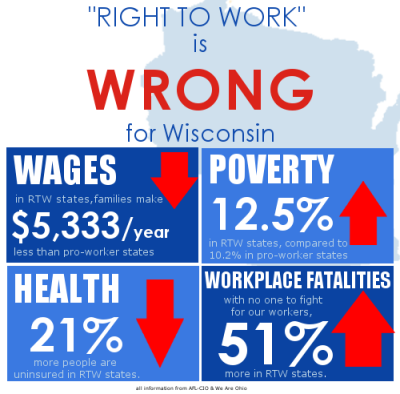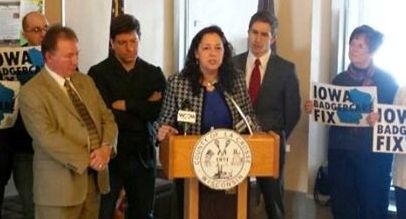
|
|

CONTACT ME:
State Capitol
Room 307 West
P.O. Box 8953
Madison, WI 53708
Phone: (608) 266-5780
Toll Free: (888) 534-0095
rep.billings@legis.wi.gov
Connect with me on social media:
![]()
![]()
|
COMMUNITY EVENTS |
American Southwest Exhibition
Description: On his explorations across the American Southwest,
photographer Chris Hood captured the beauty of locations in Utah and
Arizona from angles that would be typically unseen by most human eyes.
Date: Wednesday, Feb. 25 - Sunday, April 4.
Location: The Pump House Regional Art Center
La Crosse Bike Swap
Description: Come to the swap to re-home your dusty bikes, parts,
and accessories. Any bikes unsold at 2 p.m. must be picked up or they
will be donated to Logan Bike Works.
Date: Saturday, Feb. 28, 10 a.m. - 2 p.m.
Location: Logan Middle School
Aldo Leopold Day
Description: The Friday evening event will include readings from
Aldo Leopold's Sand County Almanac, a showing of "Green Fire: Aldo
Leopold and a Land Ethic for Our Time," and a time for conversation with
the weekend's speakers. The Saturday afternoon program from 2-4 p.m. at
the Myrick Center will include talks by Curt Meine, Leopold biographer;
Bob Clarke of the Friends of the Central Sands; and Erin O'Brien, policy
director of the Wisconsin Wetlands Association -- all on the topic of
Wisconsin water issues.
Date: Friday, February 27 (7:00 p.m.) and Saturday, February 28
(9:00 a.m. and 2-4 p.m.)
Location: Myrick-Hixon Eco Park
|
FUN FACT |
Do you know why Wisconsin is named the Badger State?
Surprisingly, it's not just because badgers are native to our state! Back in Wisconsin's history, all the way back to the 1800s, miners dug tunnels into hillsides as they searched for lead and then lived in them during the winter months to keep warm. The tunnels miners lived in reminded people of similar habitats of badgers, and Wisconsin became known as the badger state.
Friends and Neighbors,
This week, Wisconsin faced a number of proposals that could make or break Wisconsin's economic future. "Right to Work" and Medicare expansion have been prominent national issues for a number of months, sparking a great deal of discussion in Wisconsin. Wisconsin-based proposals of each issue were introduced in our legislature earlier this week. Read on to learn about the impacts of these legislative moves, in addition to news on other state and community issues.
Best Wishes,

Jill Billings
State Representative
95th Assembly District
|
Harmful Right to Work Proposal Being Fast-Tracked in Wisconsin |
|
This week, Republicans held an emergency session for the purpose of introducing Right to Work (RTW) legislation. Despite Gov. Walker's having called RTW a "distraction" earlier in the year, he has suddenly turned about-face, and is ready to sign legislation should it reach his desk. But the distraction is not why I oppose this legislation. I oppose it because of the real negative impacts it will have on La Crosse families and individuals. On a large scale, it will lead to lower wages across private and public sectors. Lower wages would affect our economy as a whole, significantly decreasing household contributions to our local businesses, and damaging the Wisconsin economy. On a personal level, however, Right to Work can have just as damaging of effects. Right to Work eliminates employees' abilities to negotiate for workplace safety. In Right to Work states, workplace fatalities increase by 51 percent. In Wisconsin this could mean that, for example, nurses would be unable to negotiate their maximum work hours. This could cause a significant issue for both workers and patients - as overworked employees create a grave health concern. RTW legislation unnecessarily inserts government into private business negotiations. Negotiations between employers and employees are necessary for profitable business. Unions ensure high-quality workers as well as a safe work environment. Without their contributions, profitability of both private and public business would suffer. The Senate introduced RTW on Monday, held a public hearing and executive session on Tuesday, and rushed to pass RTW on Wednesday. RTW passed the Senate by a vote of 17-15. Next week the Assembly will take up the legislation. A public hearing will be held on Monday, and will be considered by the full Assembly on Thursday.
|
|
BadgerCare Funding Proposal Would Save State $241 Million |
|
This week I signed on as a co-author to a bill that would save Wisconsin $241 million. Representative Daniel Riemer and Senator Jon Erpenbach have introduced a bill that would adopt a modified version of federal BadgerCare expansion, modeled after Medicaid expansion in Iowa. This bill would leverage the federal dollars available to save Wisconsin $241 million over the next two years and provide access to healthcare for more than 80,000 Wisconsinites.
For over a year, Wisconsinites have urged Gov. Walker to accept federal funding dollars for BadgerCare. In the Nov. 4 election, La Crosse County voters answered a referendum question regarding accepting federal Medicaid dollars. 70 percent of the community supported this measure, yet Gov. Walker continues to refuse these dollars.
We need to find a way to leverage these federal dollars to help relieve Wisconsin's budget deficit. Currently, our tax dollars are going to the federal government and being distributed to other states because Gov. Walker refuses to compromise. We want our tax dollars back in our state.
That is why I continue to support taking back our tax dollars and why myself along with Rep. Steve Doyle, Rep. Chris Danou, and Rep. Daniel Riemer spoke on the importance of accepting federal BadgerCare funding in Wisconsin [pictured].
|
|
Budget Update |
|
Since Gov. Walker's budget address on February 3, the Joint Finance Committee has poring over and analyzing the economic and social impacts of budget proposals.
This week, the nonpartisan Legislative Fiscal Bureau released their analysis of the budget. This analysis details fiscal impacts that budget cuts and expenditures will have on Wisconsin agencies.
Click here to view the Legislative Fiscal Bureau's budget analysis.
Next week, the Joint Finance Committee will start hearing agency testimony on individual agency budgets. Hearings are held in Room 412 East in the State Capitol. The agency hearing schedule is as follows:
Monday, March 2 (1:00 pm)
Tuesday, March 3 (9:00 am)
Wednesday, March 4 (9:00 am)
Look for additional updates on the budget process in future newsletters.
|
|
February is Teen Dating Violence Awareness Month |
|
February is Teen Dating Violence Awareness Month. Teen dating violence is a problem affecting youth in every community across the nation. One in three young people are affected by physical, sexual, or verbal dating violence. Unfortunately, this often goes undetected as only 33 percent
of teens who are in an abusive relationship ever report
abuse.
|
Sign the Save SeniorCare Petition!
 Our
SeniorCare is under attack, and we need Wisconsinites like you to stand
up for our seniors’ rights! The SeniorCare petition is still open, and I
encourage all to sign on and support our seniors.
Our
SeniorCare is under attack, and we need Wisconsinites like you to stand
up for our seniors’ rights! The SeniorCare petition is still open, and I
encourage all to sign on and support our seniors.
Over the past few months, you may have heard about Governor Walker's rejection of federal Medicaid dollars, which would have saved Wisconsin an estimated $206 million over the next two years. Throughout the state budget, and especially in health care, we can see the effects of healthcare funding rejection. Under this proposal, SeniorCare would be cut by $15 million -- a 40 percent cut. Additionally, seniors would be forced to apply for Medicare part D, which would cause them to pay more out of pocket expenses on prescription drug costs.
SeniorCare in Wisconsin is once again at risk.
If you would like to have your name removed from this email list, please reply to this message with “Unsubscribe” in the subject line

